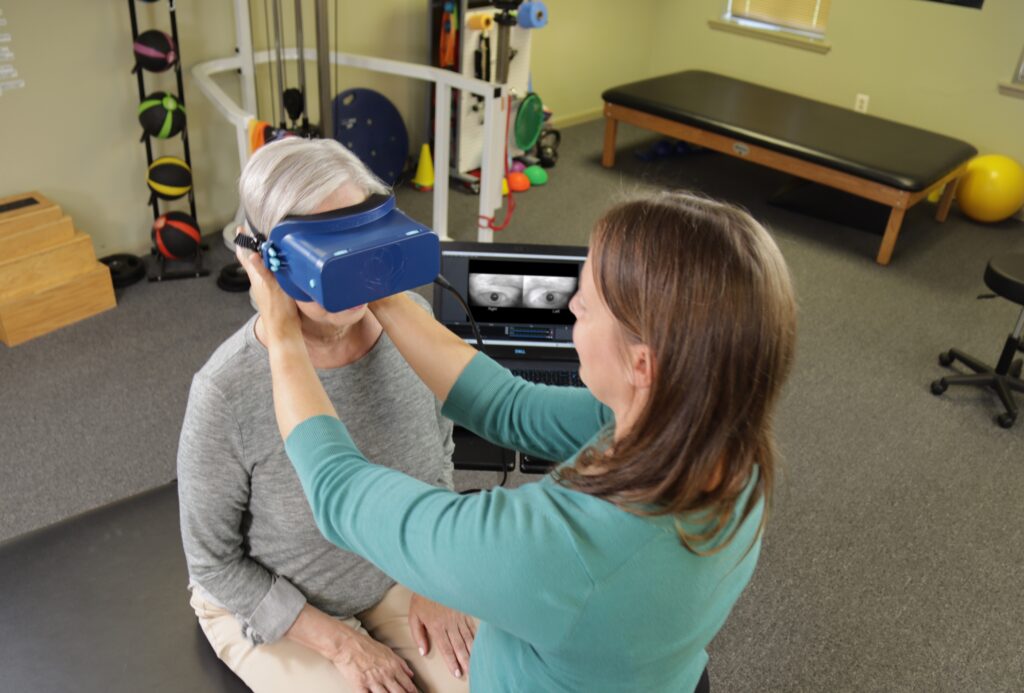We Can Help You Overcome Dizziness and Vertigo with Vestibular Rehabilitation Therapy (VRT) Through Physical Therapy at Houston Physicians’ Hospital
Vestibular rehabilitation therapy (VRT) promotes vestibular adaptation and substitution through exercise and physical therapy. Through VRT, patients can 1) to improve gaze stability which is dizziness caused by moving, blurred vision, or oscillopsia (also known as Yettus disease where the patient experiences blurred vision or their vision jumps), 2) to help postural stability or your ability to remain upright, 3) to reverse the symptoms of vertigo, and 4) to help restore your ability to do normal activities.
Vestibular Rehabilitation Therapy Program at Houston Physicians Hospital
Vestibular rehabilitative therapy is initiated following a thorough examination of the patient’s symptoms, medical history, and lifestyle.
Through a diagnostic process, physicians and physical therapists can determine the causes of dizziness and how often you’ll need therapy to address symptoms. After a thorough assessment, patients are introduced to their treatment plan, which may consist of specialized exercises to improve gait and gaze coordination as well as ocular (visual) stabilization, including:
- Balance activities
- Eye exercises
- Head exercises
- Controlled neck movement
- Shoulder movement
- Individualized strategies that improve cognitive and psychosocial functioning

- Current evidence-based treatment
- Use of Infrared Video Frenzel Goggles from Vestibular First to diagnose and treat patients
What Are the Benefits of Vestibular Rehab?
Patients begin to notice an improvement in balance, posture, mobility, and control within a few weeks of therapy. The benefits of vestibular rehab generally include:
- Improved balance
- Fewer incidences of falling
- Reduced dizziness and lightheadedness
- Enhanced stability
- Improved neuromuscular coordination
- Greater flexibility and mobility
- Improved gait
- Visual stability
- Neck movement without feeling an aching pain or tightness
- Reduced anxiety
- Improved quality of life
Physicians and physical therapists may also prescribe lifestyle changes and certain medications to assist with balance and dizziness.
Insight Infrared Video Goggles
Houston Physicians’ Hospital has invested in the latest technology to help us optimize the effectiveness of our vestibular exam. With Insight Infrared Video Goggles from Vestibular First, our specialty trained clinicians have been treating patients with a variety of conditions including:
- Benign Paroxysmal Positional Vertigo (BPPV)
- Vestibular Neuritis or Labyrinthitis
- Vestibular Migraine
- Concussion
- Meniere’s Disease
- Acoustic Neuroma (pre and post-surgery)
- Central Conditions (Vestibular Stroke, MS, etc.)
- General Imbalance and Multifactorial Dizziness
This evidence-based technology visualizes 100% of abnormal eye movements (compared to 33% with traditional thickened lens Frenzel glasses) that provides doctors with critical information enabling them to create a more accurate diagnosis and treatment. (Baba et al., 2004).
Symptoms That May Require Vestibular Rehab
According to research conducted by the NIDCD, over eight million Americans suffer from chronic balance problems. In addition, approximately 2.4 million people experience debilitating chronic dizziness.
An effective exercise-based program that can improve balance and reduce dizziness, vestibular rehabilitating therapy helps patients resume regular activities without feeling unsteady and lightheaded.
Research further indicates that over 90 million Americans suffer from chronic dizziness at least once in their lifetime. While many people recover, a large percentage of people develop recurrent balance and mobility problems that worsen with age and certain lifestyle changes.
Seeking vestibular rehabilitative therapy with the onset of symptoms helps patients gain long-term relief from the symptoms and regain their mobility.
While the condition is more common among people over the age of 70, it can occur at any age. Each year, over 10 million people consult physicians and physical therapists due to inhibiting dizziness and balance problems. Common symptoms that require vestibular rehabilitation include:
- Dizziness
- Frequent unsteadiness without an overt reason
- Vertigo
- Lightheadedness
- Floating sensation
- Blurred vision
- Loss of balance
- Neck pain and stiffness
- Inability to walk without holding onto assistive objects
- Frequent headaches
The symptoms may worsen if a person suffers from obesity, high blood pressure, high cholesterol, and chronic disorders. Drug abuse, alcohol abuse, and smoking also exacerbate symptoms, thereby restricting a person’s mobility and balance.
Our physicians and physical therapists can treat patients suffering from dizziness, vertigo, blurred vision and balance issues in Southeast Texas—including South Houston, Clear Lake, Webster, League City, Galveston, and neighboring communities throughout the area.











